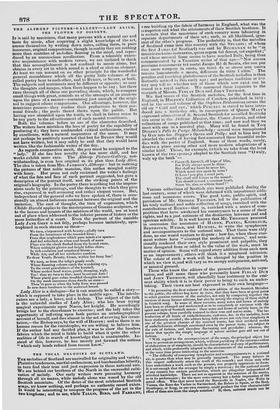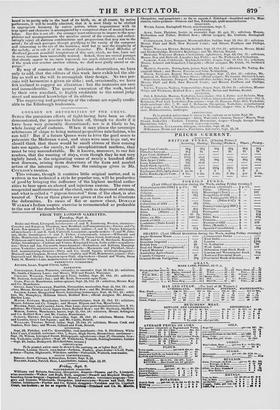THE VOCAL MELODIES OF SCOTLAND.
THE melodies of Scotland are unrivalled for originality and variety. Plaintive tenderness, martial enthusiasm, and bacchanalian hilarity, in turn find their true and just expression in these national airs. We are behind our brethren of the North in the successful culti- vation of melody. Our early writers were pursuing harmony through all its mazes, while melody alone was wooed by the old Scottish musicians. Of the dates of the most celebrated Scottish songs, we know nothing, and perhaps no authentic record exists. It would be interesting to compare the progress of the art in the two kingdoms; and to see, while TALUS, BIRD, and FARRANT,
were building up the fabric of harmony in England, what was the occupation and what the attainments of their Scottish brethren. It is certain that the musicians of each country were labouring in separate departments of their art ; each, in all likelihood, igno- rant of the other's progress. The probability is, that the melodies of Scotland came into this country with the STUARTS; of whom the first J suss (of Scotland) was said by BUCHANAN to be " in musicis curiosius instructus, quam regem vel deceat, vel expediat ;" and whose musical fame seems to have reached Italy, being thus commemorated by a Venetian writer of that age—" Noi ancora possiamo connumerar trt nostri Jacopo Re di Scozia, eke non pur cose sacre compose in canto, ma trovii da se stesso una nuova musica lameutevole e mesta, differente da tutte altre." The peculiar and touching plaintiveness of the Scottish melodies is thus distinctly noticed in this early age ; and perhaps tradition or list tory may tell us whether any of those which BOW exist can be traced to a royal author. We commend these inquiries to the research of Messrs. FINLAY Dina and Jonsr THOMSON.
We find traces of the Scottish melodies, for the first time in. England, in Ilwrosis Collection of Catches, published in 165.2: and in the second volume of the Orpheus Britannicus occurs the old air " Cold and raw," which PURCELL IS stated to have intro- duced into a birth-day ode, in consequence of Queen MARY'S expressed admiration of it. Several Scottish (or so-called Scottish) airs occur in the Delicire Musicte, the Comes Amon's, and other collections of songs published at that time; and now and then we meet with one in a musical play. Many will be found in Ton Duasnv's Pills to Purge Melancholy; several were transplanted by GAY into his Beggar's Opera and Polly; and to him may be awarded the credit of having first connected these beautiful melo- dies with the poetry of England. Some of those words, surely, deserve a place among other and more modern adaptations of a similar kind.' Those, for example, (which we take from the least known of the two operas,) adapted to the Scottish tune "0 waly, waly up the bank "— " Farewell, farewell, all hope of bliss,
For Polly always must be thine: But shall my heart be never his, Which never can again be mine? 0 Love ! you play a cruel part, Thy shaft still festers in the wound : You should reward a constant heart, Since 'tis, alas, so seldom found !"
Various collections of Scottish airs were published during the last century, some of which were deformed with impertinent addi- tions and numerous errors. The good taste, public-spirit, and patriotism of Mr. GEORGE THOMSON, led to the publication of his truly national and noble collection of songs, enriched with the contributions of BURNS—that is, enriched with a series of com- positions that have awakened his countrymen to a sense of their rights, and to a just estimate of the distinction between real and spurious nobility. It is well known that Mr. THostso:s procured in succession the assistance of HAYDN, PLEYEL, Kozatucts, BEETHOVEN, WEBER, and HUMMEL, to write the symphonies and accompaniments to the national airs. That these were ably done, no one would venture to dispute : how far, when those emi- ment writers have " o'erstept the modesty of nature," and occa- sionally rendered their own style prominent and palpable, they have derogated from or added to the value of the work, must be matter of opinion. Some will regard every addition from such men as an improvement ; others will think it a misplaced intrusion. The colour of such a work will be changed by the position in which we view it, and will vary as we occupy antiquarian, national, or musical ground. Those who know the editors of the present collection by repu- tation, and still more those who personally know FINLAY DUN and JOHN THOMSON, will cheerfully bear testimony to the emi- nent ability which it is in their power to bring to such an under- taking. 'Their views are best expressed in their own language— "In presenting the first volume of the new edition of the Scottish Melodies to the public, the editors beg leave to state, that they have been at great pains to select genuine versions of the melodies, not only by comparing together the versions of many former editions, but also by noting the singing of those skilled in Scottish song. In some of these versions, many notes and forms of melody have been so changed and modernized as to be completely at variance with the spirit and style of Scottish music : these notes and forms of melody have, in the present volume, been carefully restored to their true and native state. The in- troduction of all kinds of embellishments, cadences, &c. in the melodies, have been studiously avoided ; the editors being fully aware not only that simplicity is one of the greatest charms of the national music, but that artificial modes of embellishment, although sanctioned even by the purest taste, are subject to the rule of fashion, and therefore fluctuating and perishable ; whereas, the music that speaks the simple language of nature neither gets old nor out of fashion.
"'With regard to the accompaniment of the songs, the principal object has been to present an arrangement, which, without partaking of the extremes either of elaboration or of simplicity, should be characteristic and easy of performance, and which, while professedly adapted to the attainments of the amateur, should at the same time prove interesting to the musician. "The difficulty of composing symphonies and accompaniments to a national air, is greater than what may be generally imagined. The many failures in this respect sufficiently attest the truth of the remark ; and those only who have undertaken a work such as the present, can properly appreciate its force. It is not enough that the arranger be simply a musician ; for the national music of any country has certain peculiarities, which are altogether independent of artistica! knowledge. These are not so apparent in the notation of the music, as in its performance ; for the mere notes convey but a feeble impression of the actual effect. Who that never heard the Barcarolle in Naples, the Waltz in Vienna, the Rans des Vaches in Switzerland, the Bolero in Spain, or the Reel, Strathspey, or Song, in our own country, could produce the true characteristic effect of these airs from the simple notation? If, then, national music can be beard in its purity only in the land of its birth, or, at all events, by native rerformers. It will be readily admitted, that it is most likely to be clothed in appropriate harmony by native artists, whose acquaintance with its true spirit and character is accompanied by a competent share of musical know. ledge. But this is not all: the arranger must endeavour to impart to the sym- phonies and accompaniments the peculiar accent of the country, and unhesi- tatingly ieject all abstruse combinations and progressions that may rise to the anind ; for all such passages, though gratifying to the vanity of the composer and interesting to the eye of the rousicia,i, tend but to mar the simplicity of the melody, or to rob it of its national character. The Vocal Afelodies of Scotland present manifold temptations of this sort, which, we fear, have not in every instance been successfully resisted. Indeed, there are several passages that already appear to us, upon reperusal, too much elaborated ; and which, if the work ever reaches another edition, we shall most gladly amend or ex- punge." By way of comment on these judicious observations, we have only to add, that the editors of this work have exhibited the abi- lity as well as the will to accomplish their design. No two per- zions will harmonize a given air alike; and, occasionally, we have felt inclined to suggest an alteration : but the instances are rare and inconsiderable. The general execution of the work, tested by their own standard, is highly creditable to the sound judg- ment and musical knowledge of its editors.
The engraving and getting-up of the volume are equally credit- able to the Edinburgh tradesmen.



























 Previous page
Previous page